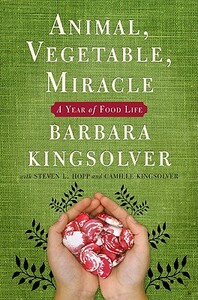Take a photo of a barcode or cover
The end of the book and Kingsolver's discussion of balance and making a small effort brought me up to 4 stars for this one, after feeling urban and guilty for much of the book. Or maybe it was just the description of turkey sex. Funny.
I feel like this should be required reading in every high school. Such a journey and so eye opening.
I 'read' the audiobook version of this book and am glad that I decided to do it this way. This was an excellent read that makes readers really think about the world around them and how their decisions can affect more than just themselves. There is so much information in here that is just really interesting...the enzymes needed to digest milk, turkey mating habits, what vegetables and plants grow when and how to harvest just about everything!
It also sort of blew my mind! I went to the grocery store after about a week of listening to this book during my weekly drives to and from work, running errands, etc. I had to literally leave the produce section without getting anything because I had new eyes about the produce sitting on the shelves. Happily I also started reading this book around the start of Farmer's Markets starting again and this helped me make my next forage into the grocery store produce section. I now take my time reading labels much more than I did before.
I had never thought about the fuel impact on bringing produce from around the world into markets everywhere. I now will. This is an eye opening book that has changed the way that I think about things. Although, there's no way I am willing to change everything based on what I learned from this book (I don't think I can give up bananas, for example), it made me more aware of my shopping decisions. Is online shopping really cheaper for example? For the individual shopper maybe but what about all the added fuel costs for delivery? I can sum up reading this book in three words:
Wow, mind blown!
It also sort of blew my mind! I went to the grocery store after about a week of listening to this book during my weekly drives to and from work, running errands, etc. I had to literally leave the produce section without getting anything because I had new eyes about the produce sitting on the shelves. Happily I also started reading this book around the start of Farmer's Markets starting again and this helped me make my next forage into the grocery store produce section. I now take my time reading labels much more than I did before.
I had never thought about the fuel impact on bringing produce from around the world into markets everywhere. I now will. This is an eye opening book that has changed the way that I think about things. Although, there's no way I am willing to change everything based on what I learned from this book (I don't think I can give up bananas, for example), it made me more aware of my shopping decisions. Is online shopping really cheaper for example? For the individual shopper maybe but what about all the added fuel costs for delivery? I can sum up reading this book in three words:
Wow, mind blown!
I haven't read any of Barbara Kingsolver's novels, but I really liked what she had to say about writing fiction vs. non-fiction in an interview at the end of this audio book. She said that in both, the narrative is what is most important, but that when writing non-fiction, your story is limited to things that actually happened. This book was a great narrative about Kingsolver's family, who set out to eat locally and organically, and to produce most of the food they consume throughout the year themselves. It really made me ache for America's wide open spaces and farming potential. I'm lucky to be starting my own little herb garden here in Japan. I can't imagine how fulfilling it must be to grow your own produce and raise your own livestock.
I also really appreciated all of the recipes her daughter Camille offers for each season. I've gone to their website and printed quite a few because most Japanese grocery stores only carry fruits and vegetables that are in season (which a few exceptions).
My only complaint was that I've heard a lot of this before. About half of the book reiterates everything I read in Michael Pollan's Omnivore's Dilemma, just in a simpler, less thought-out and researched format. It's still well worth a read, though.
I also really appreciated all of the recipes her daughter Camille offers for each season. I've gone to their website and printed quite a few because most Japanese grocery stores only carry fruits and vegetables that are in season (which a few exceptions).
My only complaint was that I've heard a lot of this before. About half of the book reiterates everything I read in Michael Pollan's Omnivore's Dilemma, just in a simpler, less thought-out and researched format. It's still well worth a read, though.
hopeful
informative
inspiring
lighthearted
reflective
slow-paced
Kingsolver had me daydreaming about owning my piece of land and, yes, even slaughtering my turkeys. The tone is light and nostalgic and humorous. The sidebars written by the author's husband are informative and thought provoking. For example, in one he discusses how shipping and trucking food in from around the world and around the country continues our dependence on oil. Without preaching, the message is clear: even little things like buying locally grown food can make a difference.
I could talk about this book for the rest of my life and I fully intend to. I will read it over and over again, savoring every bit there is to learn about homesteading and honoring the land we live on and the food we can glean from it. The recipes will live on in my family recipe book and I hope to always have a garden to supply it. Every life lesson Barbara pulls from her year living off the land is one to cherish.
funny
informative
inspiring
reflective
medium-paced
Kingsolver made me think about growing and buying food from local sources in a way that I hadn't considered. I was inspired by the family’s dedication and loved the resources and recipes provided as well as the sidebars with additional facts. I would recommend this to anyone interested in sustainability
I've always been a person to continually laud Kingsolver's work. Prodigal Summer is one of my favorite books of all time. Her writing is indescribably beautiful. Animal, Vegetable, Miracle: A Year of Food Life has been on my 'to-read' list for over a year. My husband purchased the book for me as a Valentine's Day gift, mostly because I think he tired of me picking it up and then putting it down again just about every time we entered a bookstore. What an incredible gift.
As someone who works on environmental issues as a full-time job, I was blissfully and fairly ignorant prior to reading this book about food supply in America. I buy organic milk and try to buy organic produce, but never really thought twice about the hundreds of other items that end up in my grocery cart each week. After reading this book, I'm even more committed to starting my own garden once I make that giant step towards home-ownership. My husband and I have also tossed around the idea of having chickens in the back-yard, despite the fact that we live smack dab in the middle of the city. I grateful he didn't think I was crazy when I brought up having barnyard animals in the back-yard. In addition to growing and producing my own food, I've continued to realize the importance of the local/slow food movement in terms of enhancing local economies and protecting agricultural biodiversity.
Kingsolver hits you over the head with the mantra 'you are what you eat' through lyircal and humurous antecdotal stories again again over the course of the book. She quotes Wendell Berry. "Eaters must understand that eating takes place inescapably in the world, that it is inescapably an agricultural act, and that how we eat determines, to a considerable extent, how the world is used.' Well, from my perspective that is absolutely right - and I never really thought about it that way before.
The book is written chronicling the growing season in southern Appalachia and explores her families' trials and tribulations in their one year attempt to eat only what they could grow or source locally (with coffee and olive oil being some of the only exceptions). Part memoir, part educational, part cookbook - there is something for everyone.
Read it!!!
As someone who works on environmental issues as a full-time job, I was blissfully and fairly ignorant prior to reading this book about food supply in America. I buy organic milk and try to buy organic produce, but never really thought twice about the hundreds of other items that end up in my grocery cart each week. After reading this book, I'm even more committed to starting my own garden once I make that giant step towards home-ownership. My husband and I have also tossed around the idea of having chickens in the back-yard, despite the fact that we live smack dab in the middle of the city. I grateful he didn't think I was crazy when I brought up having barnyard animals in the back-yard. In addition to growing and producing my own food, I've continued to realize the importance of the local/slow food movement in terms of enhancing local economies and protecting agricultural biodiversity.
Kingsolver hits you over the head with the mantra 'you are what you eat' through lyircal and humurous antecdotal stories again again over the course of the book. She quotes Wendell Berry. "Eaters must understand that eating takes place inescapably in the world, that it is inescapably an agricultural act, and that how we eat determines, to a considerable extent, how the world is used.' Well, from my perspective that is absolutely right - and I never really thought about it that way before.
The book is written chronicling the growing season in southern Appalachia and explores her families' trials and tribulations in their one year attempt to eat only what they could grow or source locally (with coffee and olive oil being some of the only exceptions). Part memoir, part educational, part cookbook - there is something for everyone.
Read it!!!




